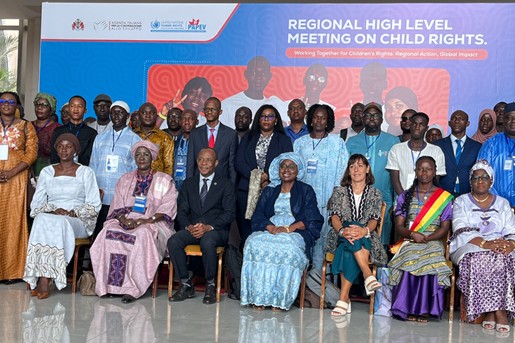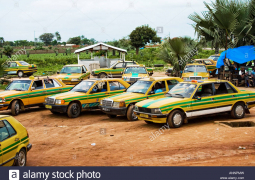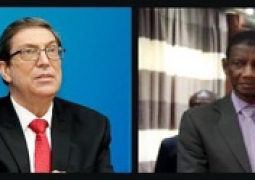
The regional forum aims to review the progress achieved since the 2022 High-Level Ministerial Meeting, assess the implementation of its recommendations, and identify both successes and challenges across member states. Participants are expected to share lessons learned and explore regional obstacles in protecting children, particularly in contexts such as cross-border mobility, gender-based violence, early marriage, and poverty-related exploitation.
Speaking at the opening, the Minister for Gender, Children and Social Welfare, Hon. Fatou Kinteh, emphasised the forum’s significance in consolidating regional efforts to safeguarding children’s rights.
She described the two-day event as a “technical and political dialogue” designed to ensure evidence-based decision-making and stronger policy commitments across the four participating nations.
“Our Directors and Technical Experts are the architects of implementation,” she stated. “Your task is to conduct a rigorous, evidence-based stocktake of the progress made on the 2022 recommendations, identify persistent gaps, and share best practices. The robustness of your technical deliberations will shape our high-level decisions.”
Minister Kinteh noted that the final day of the meeting would host the ministerial session, where political leaders would receive the experts’ recommendations and provide the necessary political will, resources, and reforms to accelerate implementation.
She expressed concern that, across the four nations, “thousands of children remain victims of unspeakable violations; sexual abuse, trafficking, child labour, forced begging, and harmful practices such as female genital mutilation and child marriage.”
Besides, she reaffirmed that these challenges also serve as a catalyst for unity and action.
“By ratifying instruments such as the Convention on the Rights of the Child and the African Charter on the Rights and Welfare of the Child, our nations have shown political will. Through the PAPEV project driven by OHCHR/WARO with ECOWAS and the Italian Agency for Development Cooperation that will has been translated into tangible action,” she added.
On behalf of the Government and people of The Gambia, Minister Kinteh welcomed participants to the “Smiling Coast of Africa,” describing their presence as “a powerful testament to our shared and unwavering commitment to the most vulnerable yet most promising segment of our populations - our children.”
She recalled that the 2022 meeting in Banjul produced the historic Banjul Declaration, which marked a collective pledge to move from rhetoric to action, reaffirming the region’s promise to transform the lives of children who represent more than half of West Africa’s population.
The Minister underscored the need to identify regional challenges that hinder child protection and progress particularly cross-border child mobility, gender-based violence, and the socio-economic drivers of exploitation. The forum, she said, provides an opportunity to share best practices and adopt practical recommendations to strengthen both national and regional child protection systems.
Representing the voices of children, Hon. Hawa Juda Tounkara, Speaker of the Children’s Assembly in Guinea, highlighted the everyday struggles children face in the region, including discrimination, early marriage, child labour, and trafficking.
“Many children are still unable to attend school due to poverty,” she said. “Through PAPEV, some have gained access to justice, but much more remains to be done. Investing in children means investing in the peace and future of our nations.”
Aminata Kebe, PAPEV Regional Coordinator, commended all partners for their collaboration, noting that despite legislative and policy progress, challenges such as child trafficking persist.
“This meeting offers a unique platform to reflect on our shared experiences and forge new perspectives to advance children’s rights, in line with both regional and international commitments,” she stated.
Representing the Italian Agency for Development Cooperation, Mme. Eugenia Pisani, Programme Officer for Gender and Human Rights, reaffirmed Italy’s commitment to the cause of children and youth in West Africa.
“Children and young people constitute more than half of the population in West Africa. Safeguarding their rights is not only a moral duty but also a prerequisite for achieving sustainable development, peace, and stability,” she said.
Pisani commended the OHCHR and regional governments for launching the second phase of the PAPEV project in 2023. The convergence was aimed at consolidating earlier achievements and addressing emerging child protection challenges. She urged participants to focus on combating gender-based violence, discrimination against children with disabilities, and harmful practices that endanger girls.
“By strengthening cross-border cooperation and renewing your political commitment,” she said, “you can help establish an inclusive, gender-responsive, and disability-sensitive child protection system. Let this forum’s recommendations lead to concrete results.”
She concluded by expressing Italy’s pride in supporting this regional partnership, describing it as “an embodiment of solidarity, shared responsibility, and commitment to the future of West Africa’s children.”
“Together,” she added, “we can turn our shared vision into reality; a West Africa where every child is protected, empowered, and able to reach their full potential.





